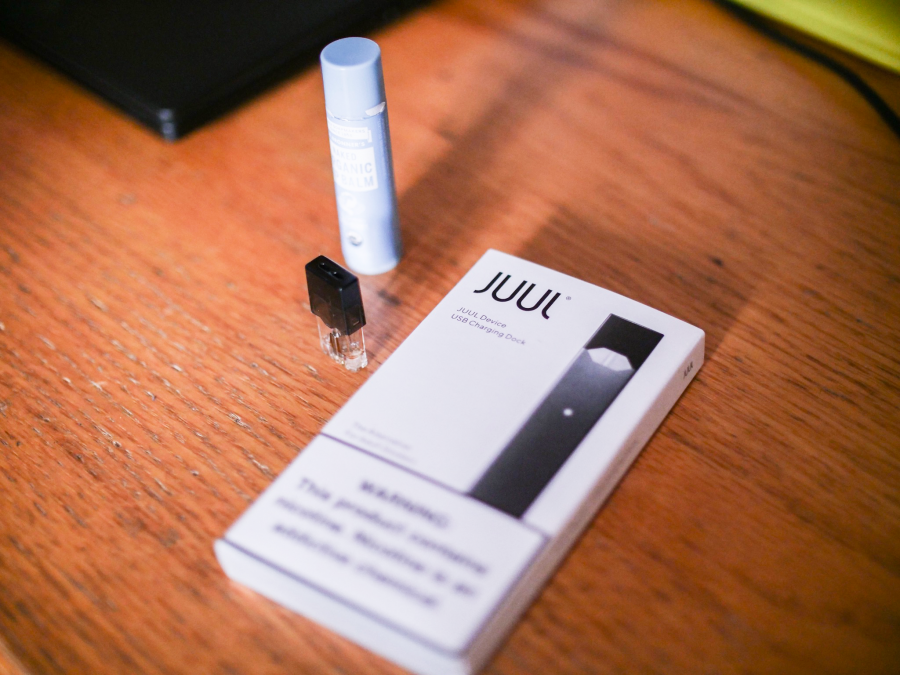He was an NYU student who would never be seen without his Juul in hand. Nicotine was, unbeknownst to him at the time, something he was becoming dependent on. He thought he could comfortably quit anytime — and one day, he tried.
In an attempt to improve his health, he ditched his Juul and gave it to a friend to help keep him accountable. However, the initiative did not last long. He started to fight with this friend, longing for his usual fix.
“And that’s what addiction looks like,” said Benjamin Poleretzky, CAS junior and close friend of this particular Juuler. “He tried to stop, he wanted to stop, he even displaced himself from the product, but found himself coming right back to it.”
With 12 confirmed deaths related to e-cigarettes (and counting), this epidemic is a growing national issue, and it is not sparing NYU students. While some students continue to cling to their vapes, others are beginning to recognize their detrimental effects.
Steinhardt senior Jasmine Choi is a regular e-cigarette user and so are all her friends. She described how she began vaping her first year.
“When you are a freshman, you just do it because it’s a social thing, and also you feel like it’s not that big of a deal,” she said.
Choi also said she never viewed the nicotine in vapes in the same light as regular cigarettes.
“You think of it just as flavored vapor, in a way,” she said.
With the plan to quit e-cigarettes after graduation, Choi realizes that her experiences mirror what a lot of people go through with smoking.
“I am concerned about my future — how [e-cigarettes are] going to affect my future, my family and my health especially,” Choi said.
A recent study published by the American Journal of Health Behavior found that attitudes and social norms surrounding e-cigarettes influence college students. The results indicated that students’ use of e-cigarettes is more likely caused by their social environment than other circumstances.
Steinhardt sophomore Abigail Basdeo is a friend of an e-cigarette smoker who has no known plans to quit. She expressed her sadness about the e-cigarette related deaths in the news and said she is concerned for her friend’s health.
She also recognized e-cigarettes are a problem at NYU. She even posted a Snapchat photo last week depicting Juul pods on the sidewalk, which she took while walking around campus.
The photo’s caption reads, “Instead of cigarette buds in the cracks of the sidewalk there are Juul pods and Idk what’s worse.”
Choi agrees that e-cigarettes are an increasing problem.
“I think it’s about time that the government recognizes this as a serious issue and takes an action,” she said.
Some have. New York Governor Andrew Cuomo banned flavored e-cigarettes using an executive action to prevent use among teens. He hopes the ban will become law during the state’s next legislative session.
More teens are vaping each year, according to the National Institute on Drug Abuse — and researchers at Dartmouth University found that many of them will transition into smoking, which is even more dangerous to their health.
Choi also said that e-cigarette companies should not include encouraging messages regarding the healthiness of vaping compared to smoking cigarettes. She is not the only NYU student upset about their marketing strategies.
“I don’t think [e-cigarette companies] care really about how you feel because to them, it’s just — they have to make money,” Basdeo said. “They are definitely lying.”
Poleretzky suggested that a government ban on e-cigarettes would not be a bad idea. At the least, he said the government should increase regulation on e-cigarette companies.
“Corporations won’t take steps to ensure public safety unless the government forces them,” he said.
When Poleretsky sees students using e-cigarettes around campus, he said he feels bad because they are “probably hooked”.
“I wish, I wish I could tell them that it is dangerous, and this is one of the worst things you could do to yourself — make yourself addicted to something,” he said. “It’s a sad but brutal truth.”
A version of this article appears in the Monday, Sept. 30, 2019, print edition. Email Tatiana Velasco at [email protected].






















































































































































